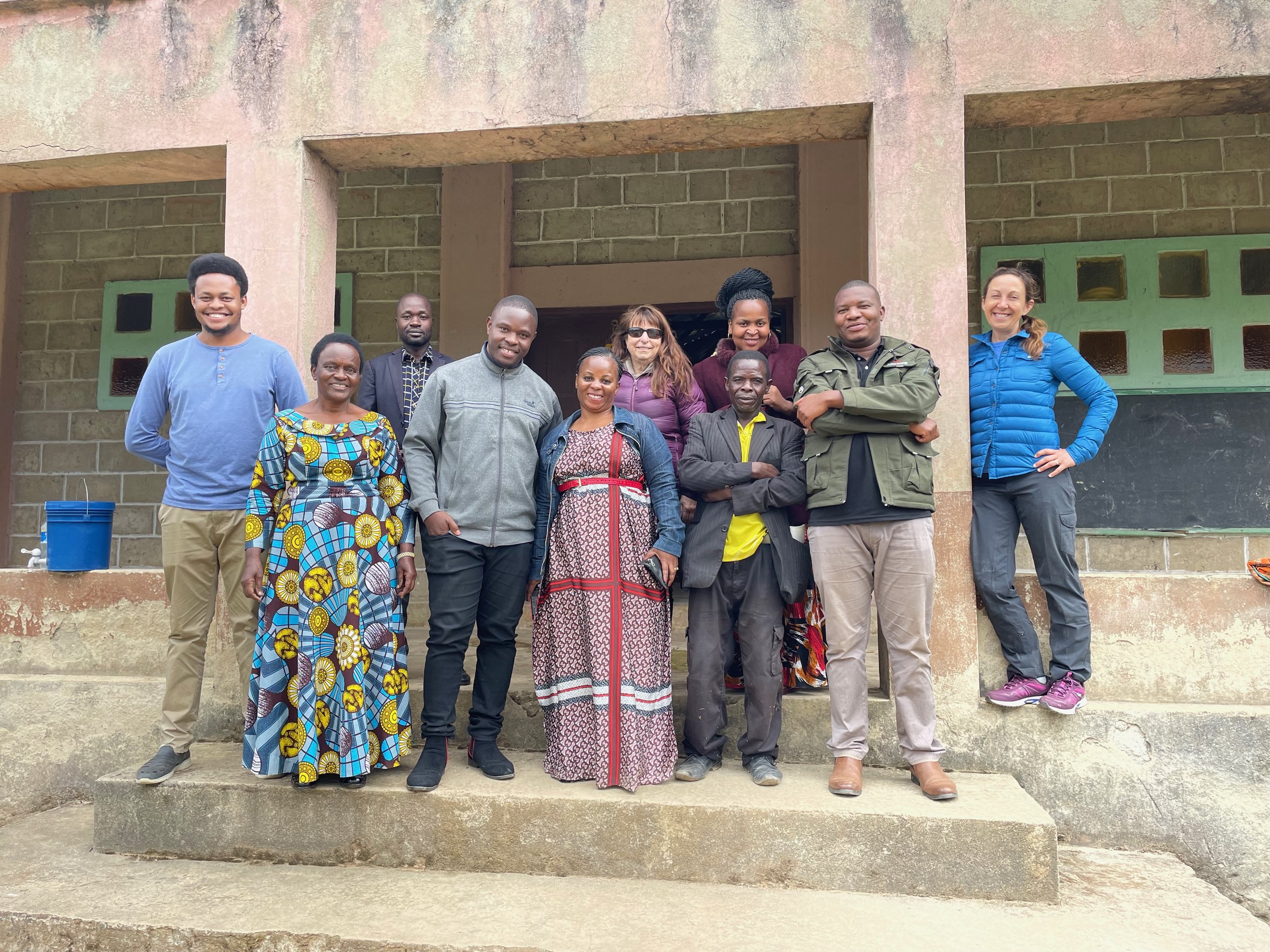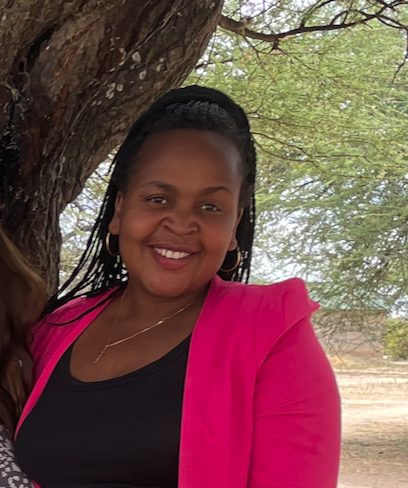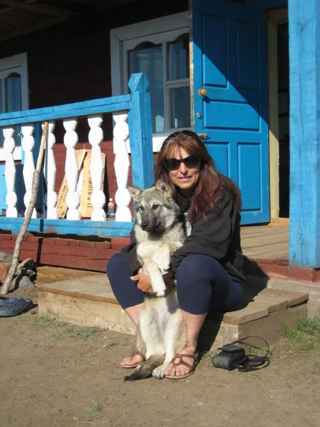Our Team
We share a vision to heal the planet through collaborative problem-solving and community-driven work to address the intersectional challenges of climate change, global pandemics, and biodiversity loss.
Team Bios
Elizabeth Komba
Co-Director, Tanzania Program
Elizabeth Gaudens Komba is an environmental conservationist and community developer. She’s worked with diverse communities and tribes in Tanzania and enjoys building partnerships with new groups to improve livelihoods and enhance local conservation.
She earned her master's degree in community development from St. John University in Dodoma, Tanzania and her bachelor‘s degree in community Development from Tumaini University in Iringa. For six years, she worked with pastoralist families and primary school children on research and education projects including topics like maternal and child nutrition and children's understanding of links between the health of people and environments.
Jesca Mlawa
Co-Director, Tanzania Program
Jesca co-directs The Foundation for Environmental Conservation and Community Enhancement (FOECOE) in Tanzania. She is an environmental conservation and community educator with strong experience working with local communities in rural areas. For many years, she has worked with primary school children and their teachers to enhance environmental conservation skills and develop livelihood improvement activities.
Her passion for the environment mingles with her her desire to conserve nature through education. She believes that young children hold the solution to many of our environmental challenges and we can encourage them to be stewards of the environment early on. During her work with communities near Ruaha National Park in southern Tanzania, she helped to develop environmental conservation teaching and learning materials for standard 1-6 students that are currently being used in more than 25 primary schools in the communities surrounding the park.
She is enthusiastic about working with communities to improve livelihoods and local conservation through activities sucha as bee keeping, organic gardening, and fish farming. Jesca is thrilled to partner with EVG as a Country Project Lead for The Women’s EARTH Project - Tanzania.
Kate Sulzner, DVM, MPVM, Cert. Conservation Management
Director and Founder
A self-described ‘big picture' person, Kate gravitates toward interdisciplinary projects that are balanced in their approach and employ strategies and interventions aimed at optimizing conditions for humans, animals, and the environment. Reflecting a desire to better understand the socio-economic and eco-epidemiologic factors underpinning biodiveristy loss and emerging health problems, Dr. Sulzner pursued a broad path of training and has held a variety of professional roles in academic, nonprofit, and private sector settings. Bridging work as a practitioner and a research scientist, she has more than 18 years of combined experience in wildlife health research, conservation management, epidemiology, and clinical veterinary medicine. Her work has taken her to rural and urban areas across North America as well as varied landscapes in Central America, South America, and Africa. Kate enjoys collaborating with people of diverse backgrounds and is drawn to projects that are rooted in cross-sectoral and cross-cultural partnerships. She is passionate about bringing people together to learn, laugh, inspire and train. Ultimately, she strives to work with others to produce sustainable, community-driven solutions that enhance the daily lives of people, while simultaneously allowing animals and natural systems to thrive. In addition to her role as Director of Ecovet Global, Kate also serves as Director of Animal Health and Conservation at CuriOdyssey, an early science learning center in San Mateo, California. She also relishes her role as partner to her architect-husband, Jerome, and mom to kids, Arlo and Zeya, and dogs, Gayle and Bird.
Carrie McNeil, DVM, MPH
Director of One Health
Carrie McNeil DVM MPH brings twenty years of experience in biosecurity, emergency readiness, policy, veterinary medicine and public health to her work strengthening global health security. From her early career work in ecosystem health through her recent global One Health readiness projects, Carrie has employed a community-based approach to understanding challenges and finding effective solutions to improve health and wellbeing of animals, people and the environment. She is currently the One Health Specialist at Ending Pandemics and a consultant with ProjectECHO. During her years as a principal technical lead at Sandia National Laboratories, she designed and led projects in biorisk management and systems analysis, and co-designed a novel online platform for tabletop exercises, PREP™ also known as STARTx. She served as a CDC Epidemic Intelligence Service Officer in New Mexico where she coordinated outbreak investigations, led multiple research projects spanning from rabies to domestic violence death reviews, and contributed to efforts addressing food insecurity and environmental health. Her emergency response background includes working as an emergency response planner at CDC, Veterinary Medical Officer with the National Disaster Medical Service, and completing multiple FEMA and DHS trainings. She completed her MPH with honors in Global Environmental Health at Emory University in 2012 with a thesis evaluating community health needs in a diverse, impoverished county. She received her DVM from University of California, Davis in 2004 and completed an internship in small animal medicine. In her early career, she worked to ensure science was incorporated into natural resources and environmental health policies as a committee consultant with the California State Legislature and director of a water-quality nonprofit.
Terra Kelly DVM, PhD, Dipl. ACZM
Scientific Advisor
Terra has over 14 years of experience as a veterinarian and epidemiologist. Her main focus is on health issues affecting animals and people and their shared environment. She is an epidemiologist at the One Health Institute in the University of California, Davis School of Veterinary Medicine, where her research focuses on diverse population health issues. She manages a number of multidisciplinary projects involving government, academic, and private organizations in the U.S., Asia, and Africa. Terra is active in international research and capacity enhancing programs designed to improve our understanding of disease dynamics at the animal-human-environmental interface and developing strategies for minimizing disease risk. She leads activities for the USAID Emerging Pandemic Threats Program PREDICT project in Ghana and contributes to the project’s efforts to build surveillance capacity for emerging infectious diseases. Terra also works in collaboration with government agencies to address important health threats, including development of innovative tools to enhance wildlife disease surveillance. She is the founder and chief executive officer of EpiEcos LLC, a small business that applies creative and rigorous approaches to solving health challenges facing animals and people.
Sophia Papageorgiou DVM, MPVM, PhD
Scientific Advisor
Sophia has a passion for animals and the outdoors and is fascinated with the world of infectious diseases. This passion led her to the University of California Davis for a Bachelor’s degree in Animal Science and Zoology and then Tufts University School of Veterinary Medicine (DVM, 1996) in wildlife and international conservation medicine. She has worked with a spectrum of wildlife species including large carnivores, hoofstock, elephants, mesocarnivores, rodents, bats, and numerous avian and reptile species. A field investigation on African elephants ignited her passion to work as an international field researcher and she completed a PhD in epidemiology (2011) emphasizing wildlife epidemiology and infectious diseases (emerging, zoonoses, vector-borne, disease ecology). Dr. Papageorgiou worked with Dr. Janet Foley at the University of California in Davis and conducted international field research on tick-borne pathogens in a population of Mongolian reindeer. Specifically, Sophia's research investigated tick-borne diseases in reindeer and domestic ungulates that interface in a dramatic taiga and grassland-forest steppe landscape. Her findings showed that there is a high prevalence of tick-borne pathogens in these animals, particularly in the reindeer. The next research step is to investigate tick-borne pathogens in ticks and small mammal hosts and understand the disease ecology of tick-borne infections in these ecosystems. This research collaboration with Dr. Foley contributes to our knowledge of tick-borne diseases in remote landscapes and provides data identifying the extent of tick-borne pathogens across the Pacific Rim.
Professionally Sophia would like to focus on field and laboratory research implementing the ‘one health’ and ‘ecosystem health’ paradigms to advance health in wildlife and domestic species, as well as the habitats in which animals and people live. In addition, she would like to train students in epidemiology, ecosystem health, and the newly defined global and one health sciences that link these disciplines.
ANDO R. Miharifetra, DVM, MSTAH, University Degree in Vaccinology and Infectiology, PGDip in Endangered Species Recovery
Scientific Advisor
Ando has over eight years of experience in the control of animal and zoonotic diseases in southeastern Africa, with special focus in Madagascar. He is a researcher at the Malagasy Institute for Veterinary Vaccines and a lecturer at the University of Antananarivo. His interest area for research is vast, varying from microbiology, infectiology, vaccinology to wildlife conservation.
Working with interdisciplinary teams and local communities in Madagascar, he focuses his work on improving healthy livestock to study its overall impacts on humans and the environment. Beyond his work, he is committed to community building, economic development, as well as organizing and improving local capacity and leadership of the rural community.








